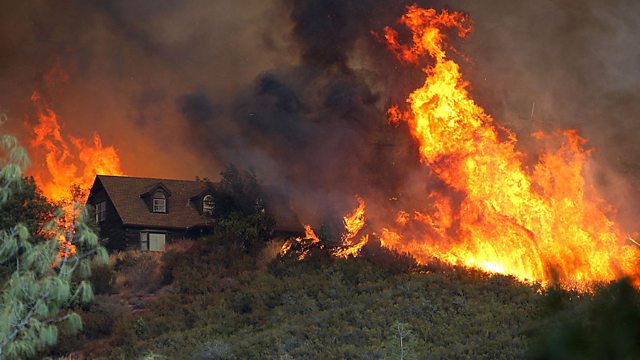
Wildfires
Wildfires; GATEway Project; Musical dissonance; Zika; The Business of Failure; “Silent" Red Hair Gene; Pokemon Go
Wildfires have been hitting the headlines this year. But is the frequency and intensity of wildfires on the increase? Can science and mapping be used more globally to mitigate the devastation and understand the causes and effects? And will a warming climate mean bigger risk? Roland Pease talks to Marc-André Parisien, a researcher with the Canadian Forest Service and Professor Andrew Scott from Royal Holloway, University of London.
GATEway Project
Self-driving, autonomous cars are on their way and the first fatality occurred just recently, causing worry for those behind the technology. But the hope is that they will one day make our journeys safer, faster and more environmentally friendly. But how will other drivers, cyclists and pedestrians react to a car that is driving its self? Will they be wary, or perhaps more pushy, knowing that in the end the driverless car will do everything it can to avoid a collision? The first UK trials that the public can take part in are just starting in an outdoor lab in London. The GATEway Project offers people the chance to ride in an autonomous car. Claudia Hammond got into the driver’s seat in a vehicle simulator at the Transport Research Laboratory in the south of England, to meet the chief scientist Dr Alan Stevens.
Musical Dissonance
We generally find the combination of notes in a consonant chord more pleasant to our ears than a dissonant one. The question is whether that reaction is learnt or simply part of our biology. It's a tricky thing to test because music is culturally ubiquitous. Neuroscientist Josh McDermott, who has found a way around this, by playing those tunes to members of a very remote Bolivian tribe - the Tsimane - and gauging their reactions. Adam Rutherford finds out more.
Past and Future of Zika Virus
The Zika virus outbreak in Latin America and the Caribbean has been raging for over a year, and some scientists are thinking that the outbreak might have hit its peak. But what will happen in the future, will this be an end to the outbreak or will Zika continue to cause problems in the area for decades to come. Understanding where the virus came from and knowledge of how related viruses, like dengue and Yellow Fever, behaved when they were introduced into the Americas may provide some important insights. We hear from University of Nottingham’s Professor of Molecular Virology, Jonathan Ball, Dr Ann Powers from Centers for Disease Control and Prevention and Dr Scott Weaver from the University of Texas Medical Branch.
The Business of Failure
Dr Kevin Fong flies with a US air ambulance crew and discovers why it is seen as one of the most dangerous occupations in America. He talks to Mike Abernethy, Professor of Emergency Medicine and Med Flight’s chief physician, about the fatal accident.
"Silent" Red Hair Gene and Sun-Related Skin Cancer
People can carry a "silent" red hair gene that raises their risk of sun-related skin cancer, experts warn. The Sanger Institute team estimate one in every four UK people is a carrier. The gene's effect is comparable to two decades of sun exposure in terms of cancerous changes, they say. While people with two copies of the gene will have ginger hair, freckles and pale skin and probably know to take extra care in the sun, those with one copy may not realise they are at risk.
Pokemon Go
Pokemon Go, a mobile game that has become a global phenomenon, has been released in the UK. It was already available in the US, Australia and Germany but some UK gamers found ways around the country restriction to get early access. The app lets players roam a map using their phone's GPS location data and catch Pokemon to train and battle.
(Photo: Flames from the Rocky Fire approach a house in Lower Lake, California © Justin Sullivan/Getty Images)
Last on
More episodes
Previous
Broadcasts
- Sat 16 Jul 2016 08:06GMT����ý World Service Australasia
- Sat 16 Jul 2016 22:06GMT����ý World Service except News Internet
- Sun 17 Jul 2016 01:06GMT����ý World Service Australasia
- Sun 17 Jul 2016 11:06GMT����ý World Service except News Internet
- Mon 18 Jul 2016 05:06GMT����ý World Service South Asia
Podcast
-
![]()
Unexpected Elements
The news you know, the science you don't

